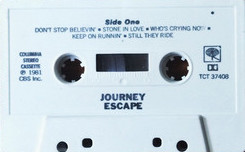Dear Reader,
This post is about something you have quite possibly never heard of: podcasts. As in broadcasts for the iPod. My first experience with podcasts was way back in 2004. Podcasts were a fairly new iTunes genre, but I loved radio shows on NPR and audiobooks, so the podcast offered a familiar and simultaneously unique form – almost like a weekly magazine but free. My favorite: Pottercast, a podcast dedicated to rehashing everything in the Harry Potter lexicon and speculating on how the series might end. One of my favorite episodes featured an interview with Matthew Lewis – he played Neville Longbottom in the movie franchise.
And now you’ve seen my nerd card. 
For some reason, despite the moderate success of standout programs like This American Life, podcasts didn’t really take off at first. They remained kind of a fringe form of media: low-budget, low-interest. Eventually, the Harry Potter book series came to a close, and I stopped listening to Pottercast and all other podcasts for a while. While the iPod itself is now virtually extinct, podcasts have hung in there, playing to a small audience week after week.
But then came a little podcast called Serial from the producers of This American Life. Season 1 of Serial hit the airwaves like a lightning bolt. If you have any curiosity about podcasts at all, download this podcast immediately and start listening. The well-produced series also presented a compelling mystery told by skilled storyteller and former crime reporter Sarah Koenig. Serial is the story of a closed case that feels pretty unresolved – the 1999 murder of a high school student from nearby Woodlawn, Maryland named Hae Min Lee. Lee’s ex-boyfriend Adnan Syed was convicted of the crime, but the facts and circumstances made his conviction, well, un-convincing. (An aside: Syed won an appeal for a new trial and the Maryland Court of Special Appeals is currently weighing the state’s appeal of that ruling for a new trial. Justice is not just blind but painfully slow and bureaucratic.) Whereas This American Life had always focused on telling several bite-sized stories on the same theme in a single episode, Serial took a new approach. Koenig unfolded the story a little bit more week by week; Serial not only held listeners in rapt attention but spawned other true-crime podcasts in its wake, including Undisclosed, Truth & Justice, and Accused. This year the producers of Serial kept the ball rolling with a new podcast, S-Town, that presented something like a southern-gothic murder-mystery. No spoilers here, but the story takes a dramatic, strange turn that left me thinking, “What am I listening to?!” – yet I couldn’t turn it off. The new format of S-Town and Netflix-style dropping of all episodes at once pushed the genre in a new direction again.
The Podcast Renaissance is going strong, and I am in awe of how many truly exceptional programs are being produced. Podcasts have transformed my commute, my workout, and my yardwork – I can’t wait to immerse myself in these episodes. When I can’t sleep, I reach for my headphones- usually a bad idea because I get engrossed in the story and don’t want to sleep, but it’s better than the 2am television waste land. Search the iTunes charts, and you’ll find some truly esoteric stuff. There’s also some pretty mainstream stuff. Pottercast still exists, in case you’re wondering – they have a new episode up once or twice a month.
Of all the truly wonderful podcasts on the charts, I would like to focus on two of them for you that I am obsessed with right now: Ear Hustle and Revisionist History.
Revisionist History features Malcolm Gladwell, celebrated cultural critic and author of books such as Blink and The Tipping Point. I love the premise of his podcast: that some things we take for granted as settled history deserve a closer look. He takes on a wide range of historical and social issues, from Winston Churchill to country music to the educational system. Gladwell always takes an angle that I am not expecting, and I truly do learn something every time I listen to it. My only criticism of the podcast is that Gladwell sometimes goes too quickly for an oversimplification of complicated problems – maybe this is part of the limitation of a 30-minute conversation, or maybe he just really believes in Occam’s Razor. A good example of this is in the Season One episode called “Food Fight” about wealthy private colleges Bowdoin and Vassar. He starts by comparing the dining options at the colleges and then progresses to a discussion of the efforts each college makes (or doesn’t make) to offer better access to low-income students. His general point is that because Vassar has cut back on dining options and student amenities, they are able to admit more low-income students. I asked a former student of mine who happened to attend Vassar during the time Gladwell recorded that episode, and she pushes back on his summation that basic options are the burden that more fortunate students must bear in order to increase opportunities for low-income students. She pointed out that the college still spends plenty of money on non-student related amenities, such as champagne-rich faculty parties, new houses for administrators, and purchasing some rare, expensive golden bird for their art collection. My student shared that Vassar made this acquisition at the same time they were preaching austerity to students, saying they’d have to cut back on providing access to basic health items such as sanitary products. So yeah, not just about food. But even though his food for students argument is a bit reductive, Gladwell does raise an interesting point about how colleges choose to use their money – and this applies to all colleges and universities, not just Vassar and Bowdoin. It makes me think harder about how my own college spends its resources.
In addition to Gladwell’s program, another real standout for me is the new podcast called Ear Hustle. If you read Piper Kerman’s book Orange is the New Black or have seen the sensationalized series on Netflix by the same name, you probably have some notions and also some questions about life for the incarcerated. Ear Hustle is set in San Quentin State Prison and produced by two prisoners, Earlonne Woods & Antwan Williams, and a local

Ear Hustle does not pull any punches and does not romanticize the plight of the inmate. The inmates are not portrayed as animals or as completely reformed saints, but as flawed men who feel the weight of what they’ve done and who face the consequences of their choices daily. The self-awareness of the inmates is disarming and somewhat unexpected. The goal of the project, I think, is simply to lift the veil so we can better understand these men – not to pity them, but to humanize them. Our criminal justice system needs desperate reform, and perhaps seeing prisoners as people – not numbers, not problems – is a good first step in that process. So the podcast is not just entertainment, but a subtle exercise in activism.
The great thing about a podcast is that it allows for deep, extended listening. I have always loved listening to things – it probably goes back to when I was a kid and used to listen to baseball games on the radio with my grandfather. Too often, it seems to me that we do what I like to call resistant listening – especially when it is something that challenges us or that goes against things we already think or believe. We don’t listen to understand – we listen in order to respond – because we live in a contentious, litigious society where everyone wants to have the last or loudest word about things. Podcasts are helping me become a better listener and by extension a better thinker about a variety of subjects – some things I never thought I’d be interested in. Because of podcasts, I really think about the criminal justice system, I really think about how my brain works, I really think about my biases and how to be more aware of them. Podcasts inspire research, questions, and conversations. From politics to pop culture, true crime to television, there really is something for everyone. And more than that, we can all stand to become better listeners.
In addition to the ones I have already mentioned throughout this post, here are a few podcasts that I highly recommend (all available through iTunes):
And I’m always looking for more. If you are already a podcast lover, tell me: what are you listening to?
© Ryna May 2017





 discounted toaster, and store security guards taser a couple of middle aged yuppies with a look of wild excitement in their eyes. This is what signals the start of the holidays now: frenzy. And yet, that’s not how it has always been. I don’t think there’s a “War on Christmas” or anything, and I have no problem with plain red cups at Starbucks, but I do feel a shift in the way Christmas feels.
discounted toaster, and store security guards taser a couple of middle aged yuppies with a look of wild excitement in their eyes. This is what signals the start of the holidays now: frenzy. And yet, that’s not how it has always been. I don’t think there’s a “War on Christmas” or anything, and I have no problem with plain red cups at Starbucks, but I do feel a shift in the way Christmas feels.

 at night when I was sad or scared and could not sleep and go huddle right in front of my mom’s living room stereo. The first night I did it, I just pushed play on the tape deck and the sound came out at me like a warm blanket, wrapped me up, and hushed me to sleep. After that first night, whenever I found myself too traumatized to sleep, I crawled to the stereo in search of that peaceful lullaby. Play. Rewind. Play. Rewind. Until sleep came over me. Years later, when I was in high school, I had a friend who was learning to play it, and I could not get enough of listening to her play those first few measures. Even today the song elicits a physical reaction – a deep breath and warm tingle that runs up the spine.
at night when I was sad or scared and could not sleep and go huddle right in front of my mom’s living room stereo. The first night I did it, I just pushed play on the tape deck and the sound came out at me like a warm blanket, wrapped me up, and hushed me to sleep. After that first night, whenever I found myself too traumatized to sleep, I crawled to the stereo in search of that peaceful lullaby. Play. Rewind. Play. Rewind. Until sleep came over me. Years later, when I was in high school, I had a friend who was learning to play it, and I could not get enough of listening to her play those first few measures. Even today the song elicits a physical reaction – a deep breath and warm tingle that runs up the spine.








